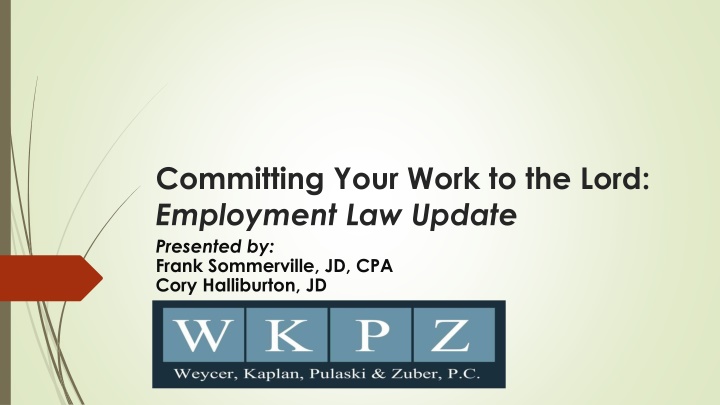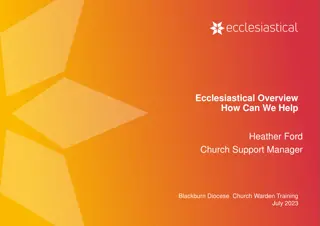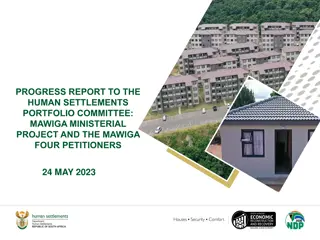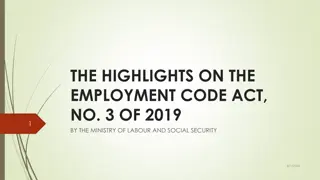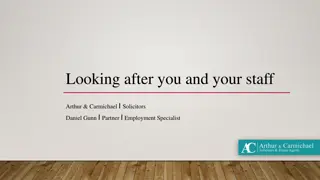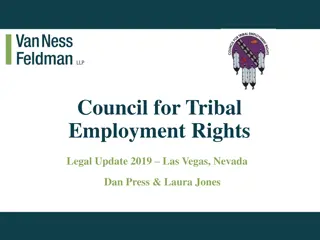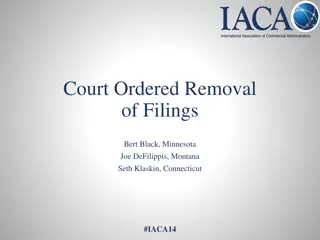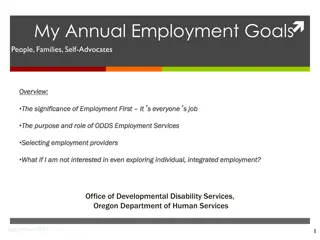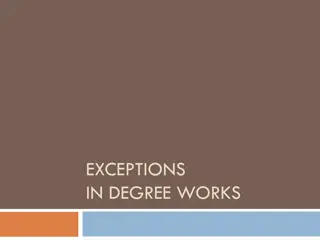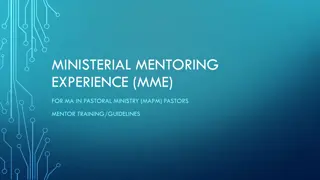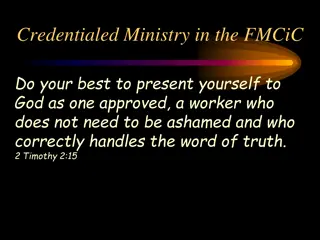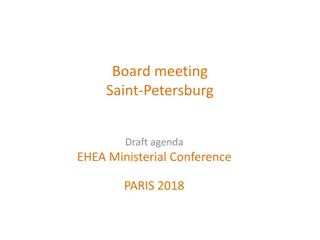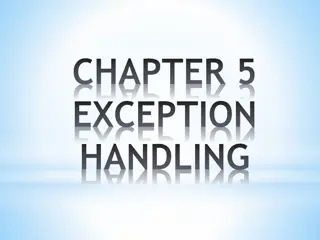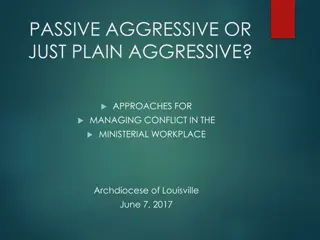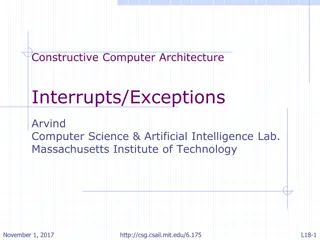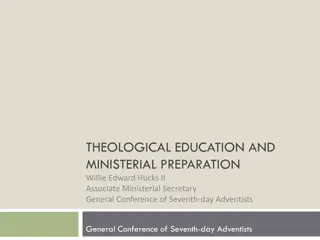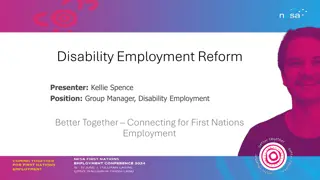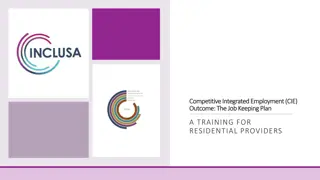Employment Law Update: Understanding Ecclesiastical Abstention and Ministerial Exceptions
This update delves into the legal concepts of ecclesiastical abstention and ministerial exceptions within the realm of employment law, focusing on cases where religious institutions are granted autonomy in employment decisions. The discussion includes instances where courts must consider neutral principles of law while avoiding interference in religious matters such as terminations based on conduct conflicting with religious beliefs or adherence to biblical standards.
Download Presentation

Please find below an Image/Link to download the presentation.
The content on the website is provided AS IS for your information and personal use only. It may not be sold, licensed, or shared on other websites without obtaining consent from the author.If you encounter any issues during the download, it is possible that the publisher has removed the file from their server.
You are allowed to download the files provided on this website for personal or commercial use, subject to the condition that they are used lawfully. All files are the property of their respective owners.
The content on the website is provided AS IS for your information and personal use only. It may not be sold, licensed, or shared on other websites without obtaining consent from the author.
E N D
Presentation Transcript
Committing Your Work to the Lord: Employment Law Update Presented by: Frank Sommerville, JD, CPA Cory Halliburton, JD
Ecclesiastical Abstention / Ministerial Exception / Church Autonomy First Amendment: Congress shall make no law respecting an establishment of religion, or prohibiting the free exercise thereof.
Ecclesiastical Abstention / Ministerial Exception / Church Autonomy Among the doctrines established under the First Amendment ecclesiastical abstention a/k/a church autonomy doctrine. Courts must avoid jurisdiction over a matter that affects religious conduct, or that establishes a religion. Theological controversy, church government, or conformity of members of the church to the standard of morals required of them. 1st Amendment does not entirely exempt decisions by religious organizations from adjudication. Civil courts may (and must) apply neutral principles of law to decide church disputes that involve no consideration of doctrinal matters. discipline, ecclesiastical
Ministerial Exception Lee v. Sixth Mount Zion Baptist Church of Pittsburgh (3rd. Cir. 2018). Ministerial exception and ecclesiastical exception prevent lawsuit against church for wrongfully terminating Senior Pastor. Court refused to enforce 20 year employment agreement that provided the Senior Pastor could be terminated only for enumerated reasons. Sterlinski v. Bishop of the Diocese of Chicago (N.D. Ill. 2018). Lawsuit for Title VII and Age Discrimination by organist barred by ministerial exception. Instrumentalists are integral to Catholic religious worship.
Ministerial Exception Kelley v. Decatur Baptist Church (N.D. Ala. 2018) Pregnant, single maintenance and child care worker, claimed church terminated employment because she was pregnant. Church claimed the termination was because she engaged in sexual conduct outside of marriage, which was a violation of biblical standards. Court: she may sue church for wrongful termination and violation of Title VII, subject to the church proving that the ministerial exception or ecclesiastical exemption applies.
Ministerial Exception McCrany v. N. Am. Missions Bd. of the Southern Baptist Convention (N.D. Miss. 2018). Does ministerial exception apply only to the minister s employer , or does it extend to an affiliated religious organization which allegedly influenced or caused the minister s termination of employment? Ministerial exception probably does not apply to non- employee relationships or to non-employment law claims.
Ministerial Exception Schultz v. Congregation Shearith Israel of the City of New York (2d. Cir. 2017). June 28, 2015 - Employee (Program Director) married. She was pregnant at the time, but not showing . Before honeymoon, she informed employer that she was pregnant. July 20 Returns; visibly pregnant. She was informed that her employment would be terminated August 14 (position elimination. July 30 Synagogue learned employee retained a lawyer. August 5 Synagogue reinstated the position. Court: Synagogue may still be liable for damages and attorneys fees under Title VII as well as for remedies afforded by the FMLA.
Ministerial Exception Fratello v. Archdiocese of New York (2d Cir. 2017). Principal of Catholic school is covered by ministerial exception. Summary judgment granted for Archdiocese. Grussgott v. Milwaukee Jewish Day School (E.D. Wis. 2017). First grade teacher at religious school is covered by ministerial exception. Alleged she was terminated because of cognitive issues resulting from a brain tumor, in violation of Americans with Disabilities Act. Summary judgment granted for school.
Interns - DOL announces changes to qualifications 1. Intern and employer clearly understand that there is no expectation of compensation. Any promise of compensation, express or implied, suggests that the intern is an employee. 2. The extent to which the internship provides training that would be similar to that which would be given in an educational environment. 3. The extent to which the internship is tied to the intern's formal education program by integrated coursework or the receipt of academic credit.
Interns 4. The extent to which the internship accommodates academic commitments by corresponding to the academic calendar. 5. The extent to which the internship's duration is limited to the period in which the internship provides beneficial learning. 6. The extent to which the intern's work complements, rather than displaces, the work of paid employees while providing significant educational benefits to the intern. 7. The extent to which the intern and the employer understand that the internship is conducted without entitlement to a paid job at the conclusion of the internship.
Former FLSA Opinion Letters Reinstated DOL reinstates 17 FLSA opinion letters that were issued by the Bush administration in January 2009. These letters were withdrawn by the Obama administration in March 2009. FLSA issues such as on call time, salary basis and full day deductions, salary basis and allowable deductions, and the exemption for teacher/coaches. Reissued opinion letters were renumbered FLSA 2018-1 through FLSA 2018-17.
Sexual Harassment Issues of sexual abuse and exploitation and gender discrimination are not just for one political party or type of theology. Kelly Rosati, vice president for child advocacy at Focus on the Family
Sexual Harassment One by one the stories tumbled out, and every single woman at that table of church members had a story to tell. Washington Post, Acts of Faith, Dec. 1, 2017, What Churches Must Do Right Now to Stop Being Part of the Sexual Harassment Problem
United Methodist Church General Commission on the Status and Role of Women -- Sexual Misconduct in the UMC: US Update 4,374 respondents to a survey (2,821 F; 1,515 M; 12 Other ) Since 2005, incidents of sexual misconduct had decreased for those identified as "clergy," "laity," or "employees" of UMC. One category increase seminary students. Overall, reports of sexual misconduct went up between 1990 and 2005. Awareness and increased educational programs, many now required by Annual Conferences and seminaries. 41.9% of incidents happened in "public settings" meetings, classes. Most perpetrators a church member, colleague, or seminary student rather than an authority figure. 52.9% of respondents who reported an incident saying, "they were believed, supported and corrective action was taken."
United Methodist Church General Commission on the Status and Role of Women -- Sexual Misconduct in the UMC: US Update Sexual misconduct categories: "looks/leers," "touching/closeness," "fondle/kiss," "comments/jokes," "mail/phone," "date pressure," "use influence," "assault attempt," and "assault." Most common reported types of sexual misconduct among men and women was "comments/jokes" "touching/closeness" (35.9%) and "looks/leers" (34.7%). Data may have been outdated before published, due mainly to subsequent and recent changes to societal and judicial view of sexual harassment. However, still informative. (40.1%) followed by
Policy Against Sexual Harassment Definition/Description of Harassment Procedure for Reporting/Complaints Procedure for Investigation Hearing/Appeal Process
Investigation of Reported Sexual Harassment Consider using outside counsel to conduct the investigation. Emotional connections can make internal investigations difficult. Many alleged perpetrators are well-liked. Some in positions or stature deemed incapable of such behavior, clouding the judgment of the investigators. The investigation team should include both genders.
Investigation of Reported Sexual Harassment Interview: complaining party supervisor potential witnesses harasser Use Open-Ended Questions: Describe what happened, what you saw, how you felt Document/Report: Who was interviewed, when and where
Sexual Harassment What to do? Consistently enforce and use policies and Employee Handbook Annual training for all employees, including clergy Teach employees to report even observed suspicious behavior, though it does not involve them Take actions reasonably designed occurrences of harassment Document Investigation and Actions Taken Personnel File Reports to prevent future
Thank you. Frank Sommerville, JD, CPA Cory Halliburton, JD
